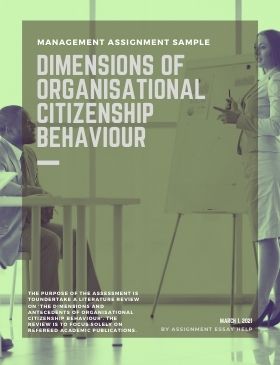
You can download the sample Management essay Critical & Study Case Analysis on Project Management with the following question for free at the end of this page. For further assistance with Management Assignment help, please check our offerings in Management assignment solutions. Our subject-matter experts provide online assignment help to Management students from across the world and deliver plagiarism free solution with a free Turnitin report with every solution.
(AssignmentEssayHelp does not recommend anyone to use this sample as their own work.)
Business Management Question
Undertake a Literature Review (max 1500 words) on ‘the Dimensions and Antecedents of Organisational Citizenship Behaviour (OCB)’. The review is to focus solely on refereed academic publications (i.e. journal articles).
Business Management Solution
INTRODUCTION
In response to the rapidly changing environment and constantly evolving challenges, organisations have to continually look up and devise new ways to grow. Today, the workplaces have grown dynamic and in order to be successful, organisations need employees who could do more than just their job roles and requirements. No doubt, Human Resource is vital for any organisation and the behaviours of employees affect the success of an organisation either directly or indirectly. When employees within an organisation frequently exert behaviours that go beyond their formal job responsibilities, they enhance and smoothen the overall functioning of that organisation.
ORGANISATIONAL CITIZENSHIP BEHAVIOUR (OCB)
Since its introduction, Organisational Citizenship Behaviour (OCB) has always proved to be of great importance for organisations. Due to this reason, understanding the nature, antecedents and dimensions of OCB have long been a matter of great concern and high priority for organizational scholars (Organ & Ryan 1995) and still remains so.
Numerous scholars have given multiple definitions for Organisational Citizenship Behaviour. According to Venkatammal & Suresh (2010), OCB can be best described as set of flexible as well as unrestricted workplace behaviors that exceed or outdo one’s formal job requirements. As per the studies of (Dyne, et al. 1995), OCB is a multi-dimensional concept which includes all positive organizationally relevant behaviors organizational members or employees including traditional in role behaviours, organizationally pertinent political behaviours, and extra-role behaviours, such as full and responsible organisational participation as well as performance. Another definition comes from the theories and research of Jahangir, et al. (2004). According to them, the Organisational Citizenship Behaviour is simply a combination and blend of desirable behaviours that ultimately contribute to the organisations success and effectiveness (Jahangir, et al., 2004). This set includes behaviours that go beyond the call of duty.
The introduction of OCB can be dated back to nearly 50 years and since then, extensive research has been performed in order to its effects on the performance of individuals and organisations. Vast majority of OCB research has come to a consensus that Organisational Citizenship Behaviour addressed silent or intangible behaviours for organisational innovativeness and growth.
Successful organisations often comprise of employees who readily go beyond their basic job roles and give off enough time and energy to succeed at the assigned roles and duties. Such selflessness or altruism is neither controlled nor mandatory, yet it enormously contributes to the effectual working of the organisation. However, employees who frequently involve in OCB may not always be the best performers, but they definitely are the ones who are known to “go above and beyond” or “walk the extra mile” to perform a merely satisfactory job (Zhang 2011).
All things considered, organisations cannot survive or prosper without their employees behaving as good citizens by engaging and involving themselves in all sorts of positive behaviours.


 WhatsApp Us
WhatsApp Us